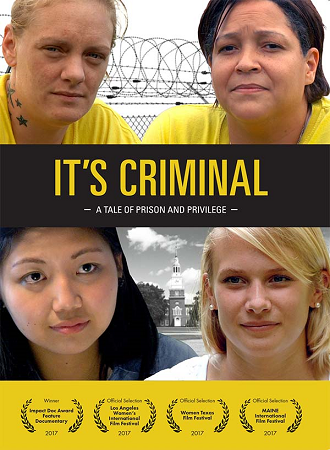
It’s Criminal: A Tale of Prison and Privilege 2017
Distributed by The Video Project, 145 - 9th St., Suite 102, San Francisco, CA 94103; 800-475-2638
Produced by Signe Taylor
Directed by Signe Taylor
DVD, 78 mins
Middle School - General Adult
Corrections; Criminal Justice; Education; Prisons; Social Justice; Theater
Date Entered: 11/14/2018
Reviewed by Kathleen Spring, Nicholson Library, Linfield College, McMinnville, OR“All of us are damaged.” “We’re replaceable…maybe.” These stark observations are uttered in Signe Taylors documentary, It’s Criminal: A Tale of Prison and Privilege, a film that demonstrates how it is possible for individuals to use performance as a social platform for reflections, even when those individuals are living in very difference circummundane. In Taylor’s film, we see the long term effects of various kinds of abuse and addictions carried in the bodies of women being held in the Sullivan County (NH) Department of Corrections. We also see what happened when those women begin interacting with a group of Dartmouth College students taking De. Ivy Schweitzer’s class “Prisoner, Women and Performance.” Through the leadership of facilitator Pati Hernandez, an adjunct professor at Dartmouth who leads a program at Sullivan County designated to get women to examine how power structures are reinforces by various social walls, participants learn from one another and engage with issues of justice and privilege.
Taylor presents alternating interviews with the incarcerated women and several students in the class, class sessions in which traditional societal power structures are discussed, as well as rehearsals for the joint production being devised by both students and inmates. Through this tapestry, the viewer begins to see threads of connection develop across the groups as they reflect on their own lives (and privilege) and how they got there. This emphasis on reflection is one of the primary strengths of both the program at Sullivan County and the documentary.
It’s Criminal provides an alternative to other films (such as Shakespeare Behind Bars (2006), which focuses on a theatrical project in a men’s prison) that showcase the transformative role theatre and performance can play in correctional facilities. Highly appropriate for a range of college course, including those in criminal justice, public policy, sociology, and theatre, It’s Criminal would also make an excellent addition to public and prison libraries.
Awards
Special Jury Prize, Documentay Section, Talca International Film Festival (Chile); Jury Prize, Documentary Section, Social Justice Film Festival (Seattle); VT PBS Made Here Award for Best Documentary, Vermont International Film Festival